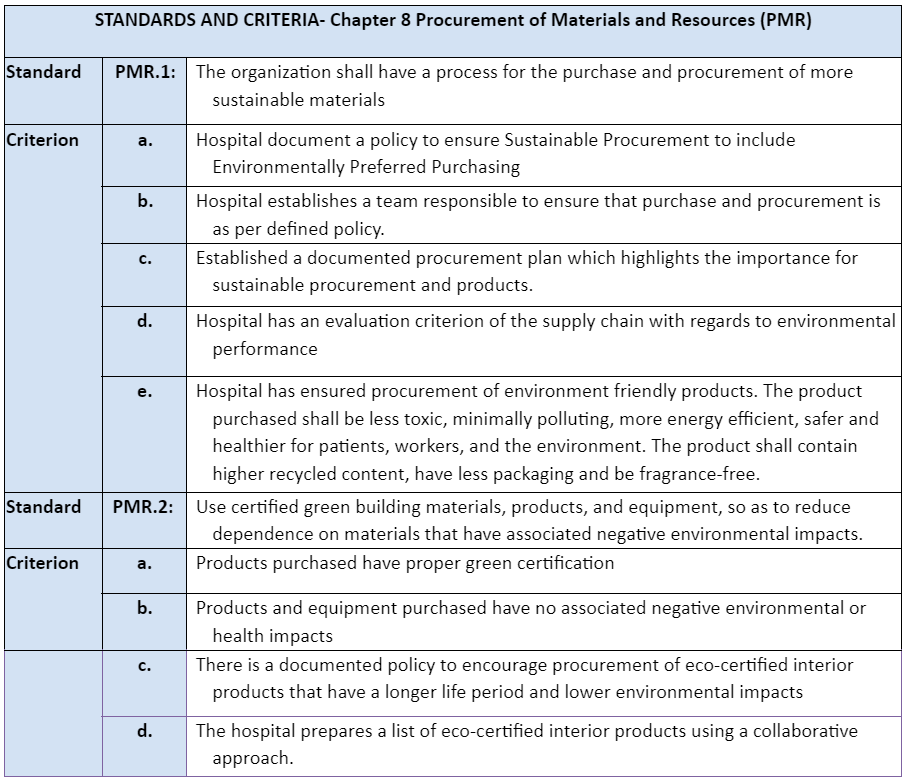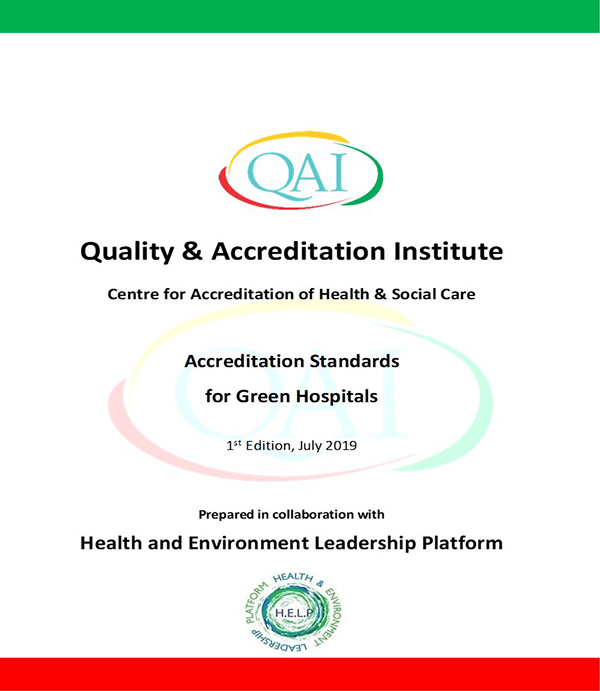Sustainable Health in Procurement Project (SHiPP) case study: Quality and Accreditation Institute, Health and Environment Leadership Platform, India
Location: Delhi, India.
Work area: Products, Policy, Process.
Summary: A comprehensive National Green Hospital Standard Accreditation was developed in collaboration with the Health & Leadership Platform (HELP) & Quality Accreditation Institute (QAI) that highlights the relationship of procurement to the standard as a whole.
Initial situation
Health care is a resource and energy-intense service sector with a huge climate footprint. Recent evidence has shown that apart from its own greenhouse gas emissions and the massive utilization of energy sources, the greatest contribution to the health sector’s carbon footprint comes from the procurement of goods and services in the entire supply chain of its operations. As a large consumer of energy and products, paradoxically the health sector also contributes to these environmental health problems, even as it attempts to address their impacts. Responding to these issues, there is a growing movement toward climate-smart, low-carbon health care. The challenge can be addressed through reduction of the health sector’s carbon footprint through the procurement of sustainable alternatives that are mindful of the environmental, social and health impacts.
Proposed alternatives
A comprehensive National Green Hospital Standard Accreditation was developed in collaboration with the Health & Leadership Platform & Quality Accreditation Institute (QAI). The developed standard was open for stakeholder consultation from March 2019 to May 2019. Experts from various national and international bodies gave their comments and suggestions in the stakeholder consultation process. The standard was successfully registered under QAI in July 2019 and its first evaluator assessor training was conducted on September 7 and 8, 2019, at the Public Health Foundation of India. The document framework includes 8 chapters, 33 standards and 127 criteria.
Progress and benefits
- The standard provides guidance to the hospital on how to conduct self- assessments.
- The standard allows an independent QAI certification for compliance of the standard(s).
- An effective sustainability strategy for greener practices in hospitals is to adopt Sustainable Procurement practices such as Environmentally Preferred Purchasing (EPP).

National Green Hospital Standards Chapter 8, Procurement of Materials & Resources
Implementation process
When planning the construction of a green hospital, materials and resources should be considered based on their associated health impacts. Every stage of material extraction, transport, use, and disposal has impacts on the ecosystem and human health. This can be reduced by making procurement decisions that reduce impacts on the environment and human health.
Next steps
- Train health care professionals.
- Pilot the standards in hospitals.
- Incorporate national green hospital accreditation standard into NABH standards.
Information about the organization
Quality and Accreditation Institute is a private limited company incorporated by the Registrar of Companies under the Companies Act 1956. QAI was set up to create an ecosystem of education, training, quality improvement and accreditation. The organization provides a platform to stakeholders including professionals and organizations, associated with quality in various fields.
Centres of QAI:
- Healthcare Quality & Improvement
- Accreditation/Certification of Healthcare Facilities
- Accreditation of Laboratories (Medical/ Testing/ Calibration)
- Education and Training Programs
- Accreditation of Veterinary Hospitals and Clinics
- Proficiency Testing for Laboratories and Blood Banks
- Project Management
- Consultancy Services for Quality and Accreditation

